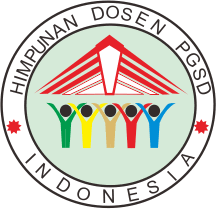Pengaruh model project based learning terhadap aspek dekomposisi pada kemampuan computational thinking mathematics peserta didik kelas iv di sekolah dasar
Abstract
Abstrak . Model pembelajaran Project Based Learning (PjBL) saat ini menjadi perhatian dalam dunia pendidikan, khususnya dalam pembelajaran matematika di tingkat sekolah dasar. Penelitian ini bertujuan untuk menguji pengaruh penerapan model PjBL terhadap keterampilan berpikir komputasional siswa kelas IV mata pelajaran matematika. Pendekatan penelitian yang digunakan adalah eksperimen sejati dengan rancangan pretest-posttest control group design. Subjek penelitian terdiri dari dua kelompok, yaitu kelas eksperimen yang memperoleh pembelajaran dengan model PjBL dan kelas kontrol yang mengikuti pembelajaran konvensional. Hasil analisis menunjukkan adanya perbedaan yang signifikan antara keterampilan berpikir komputasional siswa pada kedua kelompok tersebut. Nilai effect size sebesar 1,418 menunjukkan bahwa penerapan model PjBL memberikan pengaruh yang besar terhadap peningkatan keterampilan berpikir komputasional siswa. Dengan demikian, model Project Based Learning terbukti efektif dalam mengembangkan keterampilan berpikir komputasional pada tingkat dasar sekolah.
Keywords
References
[1] Yurniwati, M Fajri, and E Utomo 2019 Computational Thinking, Mathematical Thinking Berorientasi Gaya Kognitif pada Pembelajaran Matematika di Sekolah Dasar Din. Sekol. Dasar
[2] S Inganah, R Darmayanti, and N Rizki 2023 Problems, Solutions, and Expectations: 6C Integration of 21 st Century Education into Learning Mathematics JEMS J. Edukasi Mat. dan Sains 11(1) 220–238
[3] M S Ramirez-montoya, F E Basabe, M C Arroyo, I Azeneth, and P Zuniga 2024 Modelo Abierto De Pensamiento Complejo Para El Futuro De La Educacion Model. abierto Pensam. complejo para el Futur. la Educ 1(1)
[4] S Farias-Gaytan, I Aguaded, and M S Ramirez-Montoya 2023 Digital Transformation and Digital Literacy in the Context of Complexity Within Higher Education Institutions: A Systematic Literature Review Humanit. Soc. Sci. Commun 10(1) 1–12
[5] R Tariq, B M Aponte Babines, J Ramirez, I Alvarez-Icaza, and F Naseer 2024 Computational thinking in STEM education: current state-of-the-art and future research directions Front. Comput. Sci 6(1)
[6] R Irawati, I Nurwulan, and H Subarjah 2017 Pengaruh Problem-Based Learning dengan Strategi TAPPS terhadap Kemampuan Pemecahaan Masalah Matematis pada Materi Perbandingan J. Pena Ilm 2(1) 811–820
[7] M. K. Ni’am, L. Lia, N. A. Salsabila, N. Fitriyani, and N. H. M. Sari 2022 Pembelajaran Matematika berbasis Computational Thinking di Era Kurikulum Merdeka Belajar SANTIKA Semin. Nas. Tadris Mat 2(1) 66–75
[8] N. I. Azizah, Y. Roza, and M. Maimunah 2022 Computational Thinking Process of High School Students in Solving Sequences and Series Problems J. Anal 8(1) 21–35
[9] W. J. Rijke, L. Bollen, T. H. S. Eysink, and J. L. J. Tolboom 2018 Computational Thinking in Primary School: An Examination of Abstraction and Decomposition in Different Age Groups Informatics Educ 17(1) 77–92
[10] N. N. Adiyastuti, S. Sutama, and Y. M. Hidayati 2024 Computational Thinking Analysis in Solving Elementary School AKM Numeracy Problems Prem. Educ. J. Pendidik. Dasar dan Pembelajaran 14(2) 121–137
[11] S. Maharani, T. Nusantara, A. Rahman Asari, and A. Qohar 2020 Computational Thinking Pemecahan Masalah di Abad Ke-21 Critical Thinking View Project Teaching for Critical Thinking View Project in Computational Thinking Pemecahan Masalah di Abad ke-21, 14(2) 66
[12] H. Kuswanto, N. Rodiyanti, Y. N. Kholisho, and B. D. D. Arianti 2020 Pengaruh Kemampuan Matematika terhadap Kemampuan Computational Thinking pada Anak Usia Sekolah Dasar Educatio 15(2)
[13] M. R. Manurung, S. H. B. Sormin, L. Novita, and A. J. B. Hutauruk 2022 Pengaruh Model Pembelajaran Project Based Learning (PjBL) terhadap Kemampuan Literasi Matematis VIII SMPN 1 Simanindo Laplace J. Pendidik. Mat 5(2) 391–400
[14] F. Kalelioglu, Y. Gulbahar, and V. Kukul 2016 A Framework for Computational Thinking Based on a Systematic Research Review Balt. J. Mod. Comput 4(3) 583–596
[15] W. I. Syahputra and B. Sinaga 2024 Peningkatan Kemampuan Berpikir Komputasional Siswa Melalui Penerapan Model Pembelajaran Berbasis Proyek J. Ris. HOTS Pendidik. Mat 4(1) 1–26
[16] A. Y. Pranata, D. Lyesmaya, and L. H. Maula 2024 Pengaruh Model Pembelajaran Project Based Learning Terhadap Kemampuan Berpikir Komputasi Pada Pembelajaran Bangun Datar Siswa Kelas V,” Pendas J. Ilm. Pendidik. Dasar 9(1) 3142–3148
[17] Sugiyono 2017 Metode Penelitian Kuantitatif, Kualitatif, dan R&D. Bandung: Alfabeta
[18] S. Arikunto 2021 Dasar-Dasar Evaluasi Penelitian Edisi 3
[19] J. Arnastauskaitė, T. Ruzgas, and M. Bražėnas 2021 An exhaustive power comparison of normality tests Mathematics 9(7) 1–20
[20] D. Shin, N., Bowers, J., Krajcik, J., & Damelin 2021 Promoting computational thinking through project-based learning Discip. Interdiscip. Sci. Educ. Res 3(1)
[21] J. L. Gastwirth, Y. R. Gel, and W. Miao 2009 The Impact of Levene’s Test of Equality of Variances on Statistical Theory and Practice Stat. Sci 24(3) 343–360
[22] J. W. Thomas 2000 A review of research on project‑based learning. San Rafael, California: Autodesk Foundation
[23] S. Bell 2010 Project-Based Learning for the 21st Century: Skills for the Future Clear. House A J. Educ. Strateg 83(2)
[24] J. Shute, Valerie J.; Sun, Chris; Asbell‑Clarke 2017 Demystifying computational thinking Educ. Res. Rev 22(2) 147–158
[25] A. W. Asmi, F. Rahmat, and M. Adnan 2022 The Effect of Project-Based Learning on Students’ Mathematics Learning in Indonesia: A Systematic Literature Review Int. J. Educ. Inf. Technol. Others 5(4) 311–333
[26] N. Rehman, W. Zhang, A. Mahmood, M. Z. Fareed, and S. Batool 2023 Fostering Twenty-First Century Skills Among Primary School Students Through Math Project-Based Learning Humanit. Soc. Sci. Commun 10(1)
[27] X. Zhang, Y., Guan, Y., & Hu 2024 The Effect of Project-Based Learning on Students’ Computational Thinking: A Meta-Analysis Educ. Inf. Technol 29(1) 145–168
[28] Y. Yunita, D. Juandi, M. Tamur, A. M. G. Adem, and J. Pereira 2020 A Meta-Analysis of the Effects of Problem-Based Learning on Students’ Creative Thinking In Mathematics Beta J. Tadris Mat 13(2) 104–116
[29] A. Peel, T. D. Sadler, and P. Friedrichsen 2021 Using Unplugged Computational Thinking to Scaffold Natural Selection Learning Am. Biol. Teach 83(2) 112–117
[30] F. Mumcu, E. Kıdıman, and F. Ozdinc 2023 Integrating Computational Thinking Into Mathematics Education Through An Unplugged Computer Science Activity J. Pedagog. Res 7(2) 72–92
[31] P. Musmarra and M. R. Del Sorbo 2025 Learning Geometry using Computational Thinking, Scratch and Python Turtle 16th Int. Conf 14(1)
[32] R. N. Asmah, N. Hasanah, and E. L. S. Lubis 2025 Pengaruh Metode Computational Thingking terhadap Kemampuan Berfikir Kritis Siswa Kelas V SD Didakt. Dwija Indria 13(1) 128–135
[33] J. T. Widianto, I. R. W. Atmojo, and R. Ardiansyah 2024 Hubungan Kecerdasan Linguistik dengan Computational Thinking pada Peserta Didik Kelas V Sekolah Dasar,” Didakt. Dwija Indria 12(4) 268–271
[34] S. Yunianingrum, I. R. W. Atmojo, and Hadiyah 2021 Peningkatan Keterampilan Menyimpulkan Melalui Model PjBL (Project Based Learning) pada Pembelajaran IPA Didakt. Dwija Indria 7(7) 24–29
Refbacks
- There are currently no refbacks.



